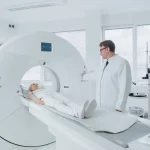This is essentially a very simple blood test that measures the amount of PSA (a protein produced by prostate cells). When the amount of PSA is high or increases over time, this antigen volume then points to an issue with the prostate, which is not necessarily cancer. Your healthcare professional may recommend additional testing to determine the cause.
The PSA test results will in turn determine the frequency at which further tests will be performed.
Rectal touch
This examination consists of a healthcare professional inserting a finger into your rectum. This allows for checking the size and shape of the prostate as well as identifying the presence of any anomalies or unusual forms. The examination is not painful but can entail a certain degree of discomfort.
The two previously mentioned tests are most useful when done in tandem.
It is important to understand that these exams are not 100% reliable and come with both advantages and inconveniences.
While some prostatic cancers are aggressive and require treatment, this is not always the case. Some cancers develop slowly and may never pose a problem, i.e., only require monitoring.
If you develop symptoms such as urinary issues or erectile dysfunction, or if you are concerned about your health and wish to undergo screening tests, speak with your attending physician.
If you do not have access to a family doctor, turn to the Primary Care Access Point.
To learn more about the advantages and limitations of prostatic cancer screening, read:
Procure. All about screening. Is it for you?
Université Laval. Dépistage du cancer de la prostate. Choisir de faire ou de ne pas faire le test de dépistage (in French only)
For healthcare professionals:
Outil pour faciliter la discussion sur les recommandations de l’INESS sur le dépistage de cancer de la prostate par dosage de l’antigène prostatique spécifique (APS) (in French only)

































